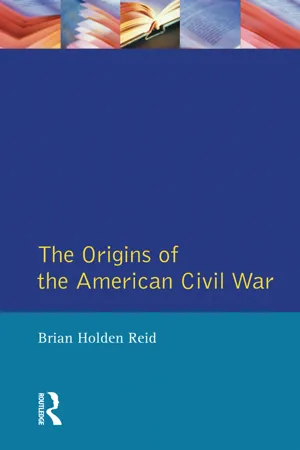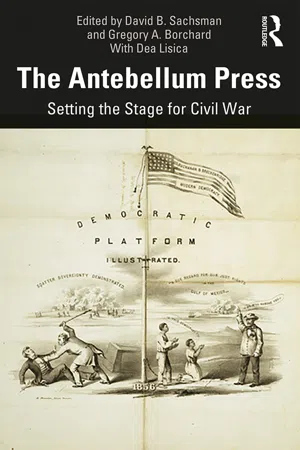History
1860 Democratic Convention
The 1860 Democratic Convention was a pivotal event in American politics, held in Charleston, South Carolina. The convention was marked by deep divisions over the issue of slavery, leading to the split of the Democratic Party into Northern and Southern factions. This division ultimately contributed to the election of Abraham Lincoln as the first Republican president.
Written by Perlego with AI-assistance
Related key terms
2 Key excerpts on "1860 Democratic Convention"
- eBook - ePub
- Brian Holden Reid(Author)
- 2014(Publication Date)
- Routledge(Publisher)
Will always keep a “Pryor” engagement – a reference to Roger Pryor, a Virginia secessionist. The Convention was just as much theatre as political forum. Groups of men were enjoined to shout chants for their candidate; here Lincoln, a local figure, enjoyed an enormous advantage. Bargains were struck on the convention floor, gossip, the lifeblood of politics and the addiction of professional politicians, was exchanged, and agreement was reached. As Halstead made clear, ‘the amount of idle talking that is done is amazing’.Men gather in little groups, and with their arms about each other, and chatter and whisper as if the fate of the country depended upon their immediate delivery of the mighty political secrets with which their imaginations are big. There are a thousand rumours afloat, and things of incalculable moment are communicated to you confidentially, at intervals of five minutes.… The current of the universal twaddle this morning is that ‘Old Abe’ will be the nominee.Allan Nevins rightly described this gathering as ‘bedlamite confusion’. Experts at political gatherings are often proved wrong in their predictions, and the most striking feature of conventions in the nineteenth century was their propensity for throwing aside famous and accomplished candidates in favour of the comparatively untried and inexperienced man. In 1852 the Democrats had chosen Franklin Pierce, a man overwhelmed by his responsibilities and unequal to the demands of his high office; in 1860 the Republican Party was rather more fortunate.22The confusion and loquacity of the proceedings at Chicago at first sight appeared to be an obstacle to reaching a wise decision as to who should lead the party into the most important race since the unopposed election of George Washington in the first presidential election of 1792. On 16 May David Wilmot, now past his best, was appointed chairman. ‘He is a dull, chuckel headed booby looking man’, Browning thundered in his diary, ‘and makes a very poor presiding officer’.23 - eBook - ePub
The Antebellum Press
Setting the Stage for Civil War
- David B. Sachsman, Gregory A. Borchard(Authors)
- 2019(Publication Date)
- Routledge(Publisher)
Part III The Election of 1860 and the Crisis of SecessionPassage contains an image
17
The Democrats Divide
Newspaper Coverage of the 1860 Presidential Conventions
Brian GabrialAs the nation headed into the 1860 election season, it would not be business as usual. For one thing, the aftershocks of John Brown’s raid on Harpers Ferry continued to haunt the world of politics despite it being months since his neck met the noose. Indeed, his very name became an agitprop for Southern Democrats and their newspaper allies to use against the upstart Republicans. “The success of such a party,” a Richmond Enquirer editorial said shortly after Republicans met for their May convention, would encourage “all the John Browns that now secretly await an opportunity to avenge the death of the pioneer in the cause of which is to be perfecter and finisher.”1 But while the Republicans were settling on their antislavery platform and candidate, the Democratic Party was falling apart. The first Democratic convention failed to select a presidential candidate, and the second convention would fail as well. All the while, a significant portion of the Democratic delegates had already decided party unity did not matter unless they secured a proslavery platform and the right candidate to support it.On some level, the irony of the 1860 election was that the political party with the most to lose over slavery was the party most in favor of it. Democrats, North and South, wrestled with a single question: How much should slavery be supported? The Richmond Enquirer articulated the Southern view perfectly in its almost daily reminder of what the party should stand for on the “Slavery Question”: “Absolute non-interference,” its editor wrote, “by the General Government, to introduce or to exclude slaves, in any of the territories of the Union.”2 No less insistent on that point was the Charleston Mercury ’s Robert Barnwell Rhett, who warned ten days before the Democrats met for their first convention in Charleston, that the South “should take her rights and destiny into her own hands” if Northern voters voted against a proslavery candidate.3 The fire-eater demanded that the election results should give Southerners “peace with our rights and institutions.” For Rhett and others like him, this meant the victor in the next presidential election had to profess non-interference when it came to slavery or, as Rhett wrote, Southerners would “take a separation of our Union with them.”4
Learn about this page
Index pages curate the most relevant extracts from our library of academic textbooks. They’ve been created using an in-house natural language model (NLM), each adding context and meaning to key research topics.

